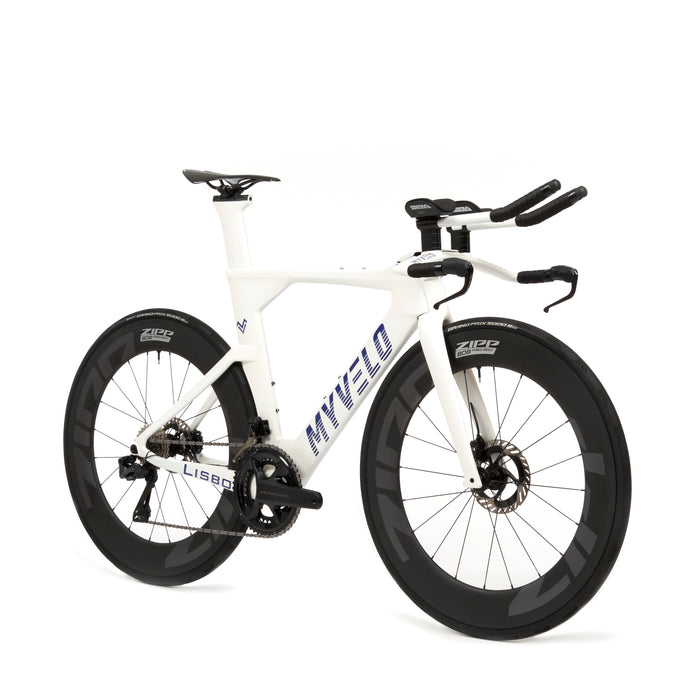
Lisboa triathlon bike
incl. FREE shipping & free returns

Von Vincent Augustin |
6 minutes read time

Are you training for a triathlon or do you love road cycling ? This article focuses on the questions - what, when and how much to eat after training in order to get the most out of every workout. You can expect scientific facts and practical tips that will help you maximize your training results while giving your body everything it needs to regenerate.
Your post-workout nutrition plays a crucial role in achieving optimal training results. After intense physical activity, the body needs specific nutrients to support muscle recovery and replenish energy levels. Here are three important points to consider:
A good example of a post-workout meal could be a protein shake with a banana and a handful of oatmeal. This provides both protein for the muscles and carbohydrates to replenish energy stores. Ultimately, it is crucial that you listen to your body and provide it with the nutrients it needs. Your post-workout nutrition can make a big difference in your training success.
Regeneration after an intense workout is just as important as the training itself. Your muscles need a number of specific nutrients to recover and grow effectively.
First, proteins are essential. They provide the amino acids that serve as building blocks for muscle growth. Some studies recommend around 20g of protein after training, with sources such as chicken, eggs, tofu or a protein shake being ideal.
Secondly, carbohydrate intake also plays an important role. They help replenish the glycogen stores in your muscles that you have used up during training. Good sources of carbohydrates are whole grains, fruits and vegetables.
Finally, fats should not be neglected. In particular, omega-3 fatty acids, which are found in foods such as salmon, chia seeds and walnuts, can support muscle regeneration.
You should also make sure you drink enough fluids to compensate for fluid loss through sweating. Water is always a good choice, but isotonic drinks can also be useful.
In addition, certain micronutrients, such as vitamins C and E, as well as magnesium and zinc, can promote muscle recovery. They are found in a variety of foods, such as citrus fruits, nuts and seeds, whole grains and green leafy vegetables.
Always remember that a balanced and varied diet is key to providing your body with all the nutrients it needs.
Quick snacks and full meals are both important aspects of a balanced diet, but they serve different purposes. Full meals provide a rich mix of proteins, carbohydrates and fats that give your body the energy it needs to get through the day. They also contain important vitamins and minerals that are essential for good health.
Complete meals include, for example:
Quick snacks, on the other hand, are perfect for when you're feeling a little peckish between meals. They're often high in protein and fiber, which help you feel full and avoid cravings. They can also provide important nutrients that may be missing from your main meal.
Examples of healthy, quick snacks include:
Although quick snacks can be convenient and nutritious, they are not a substitute for a full meal. A balanced diet should include a combination of both. This way, you can ensure that your body gets all the nutrients it needs while still being able to satisfy small hunger pangs. It is important to always pay attention to the quality of your snacks and meals and to choose unprocessed, natural foods wherever possible.
The right time to eat after training is an important factor for optimal regeneration and performance. Studies show that the body utilizes absorbed nutrients particularly well in the 30 minutes to 2 hours after training. This time window is called the "anabolic window". During this phase, the muscles are particularly receptive to proteins and carbohydrates, which are needed to repair micro-damage and replenish glycogen stores.
Recommendations vary depending on the type of training and individual needs, but here are some general guidelines:
Examples of suitable post-workout meals could be a protein shake with fruit or a whole grain sandwich with chicken and vegetables. However, remember that it's not just the "what" that matters, but also the "when." So it's not just what you eat after your workout that matters, but also when you eat it.
A well-timed, balanced post-workout meal can improve your recovery and performance, but remember that every body is unique and it's important to pay attention to your individual needs and responses.
Hydration plays an essential role in recovery and is an aspect that is often underestimated. After an intense training session or competition, the body loses a lot of fluids and important electrolytes through sweat, which are responsible for the smooth running of many bodily functions. These losses must be quickly replaced to promote recovery and avoid the risk of dehydration and related problems such as fatigue, muscle cramps and reduced performance. Restoring fluid balance can be achieved through simple measures such as:
To determine individual hydration needs, body weight can be compared before and after training. The difference indicates how much fluid needs to be lost and replenished. By consistently paying attention to these aspects, recovery can be accelerated and athletic performance optimized. But be careful: too much water can also be harmful, so a balanced ratio is important.
Good post-workout meals are crucial for effective recovery after training. They provide the necessary nutrients to repair and strengthen muscles and replenish energy levels. Here are six recipe ideas that might inspire you.
Each of these recipes provides a balanced mix of protein and carbohydrates to aid post-workout recovery. They're easy to make and taste delicious. Try them out and see which ones best suit your taste and diet plan.
When it comes to achieving your fitness goals, nutrition plays a crucial role. With the right nutrition, you can maximize your results and support your body in the best possible way. Here are the most important aspects to consider:
Always remember that optimal nutrition varies from person to person and depends on various factors such as your gender, age, height, weight and physical activity level. It is therefore advisable to seek professional advice to create a nutrition plan tailored to you and to ensure that you provide your body with everything it needs to achieve your fitness goals.

Als Rennradfahrer möchte man möglichst ständig besser werden: schneller, ausdauernder und effizienter. Doch was, wenn der Schlüssel zu diesen Zielen nicht nur auf zwei Rädern liegt? Rudern, oft unterschätzt, bietet eine ideale Ergänzung zum Radtraining. Es trainiert nicht nur den ganzen Körper, sondern verbessert auch die Ausdauer, Kraft und Stabilität – entscheidende Faktoren für jeden Radsportler.

Nach einer intensiven Rennrad-Einheit ist die richtige Regeneration entscheidend, um Leistung zu verbessern, Verletzungen zu vermeiden und langfristig Fortschritte zu erzielen. Doch wie sieht eine effektive Erholung aus? Hier bekommst Du die besten Tipps zur optimalen Regeneration nach dem Rennradtraining.

Erfahre, wie Radsport-Ligen aufgebaut sind und weitere Infos zur Organisation im Profi-Radsport!